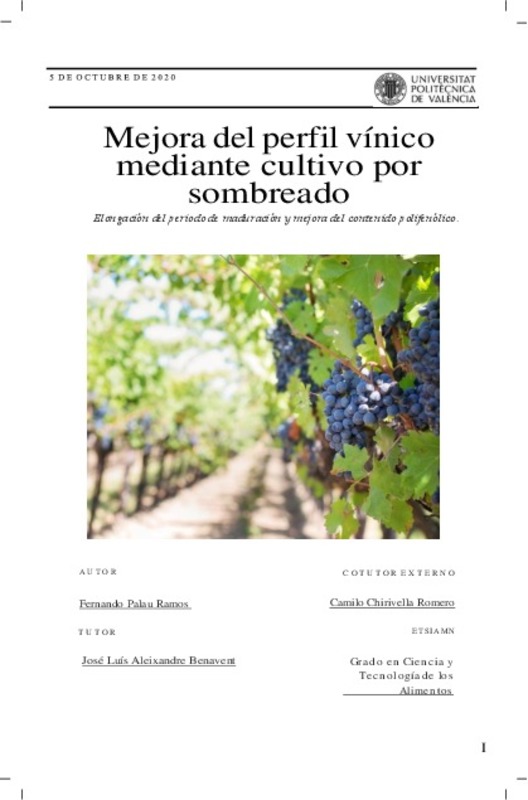JavaScript is disabled for your browser. Some features of this site may not work without it.
Buscar en RiuNet
Listar
Mi cuenta
Estadísticas
Ayuda RiuNet
Admin. UPV
Mejora del perfil vínico mediante cultivo por sombreado
Mostrar el registro completo del ítem
Palau Ramos, F. (2020). Mejora del perfil vínico mediante cultivo por sombreado. Universitat Politècnica de València. http://hdl.handle.net/10251/155079
Por favor, use este identificador para citar o enlazar este ítem: http://hdl.handle.net/10251/155079
Ficheros en el ítem
Metadatos del ítem
| Título: | Mejora del perfil vínico mediante cultivo por sombreado | |||
| Autor: | Palau Ramos, Fernando | |||
| Director(es): | ||||
| Entidad UPV: |
|
|||
| Fecha acto/lectura: |
|
|||
| Resumen: |
[ES] El cambio climático está modificando el periodo de maduración de las distintas variedades de uva, afectando los contenidos en azúcar, acidez, y compuestos polifenólicos. Estos cambios afectan negativamente a las ...[+]
[EN] Climate change is modifying the maturation period of the different grape varieties, affecting the sugar content, acidity, and polyphenolic compounds. These changes negatively affect the early varieties, which see their ...[+]
|
|||
| Palabras clave: |
|
|||
| Derechos de uso: | Reserva de todos los derechos | |||
| Editorial: |
|
|||
| Titulación: |
|
|||
| Tipo: |
|
Localización
recommendations
Este ítem aparece en la(s) siguiente(s) colección(ones)
-
ETSIAMN - Trabajos académicos [3541]
Escuela Técnica Superior de Ingeniería Agronómica y del Medio Natural







